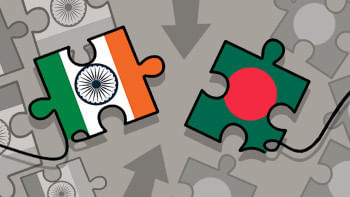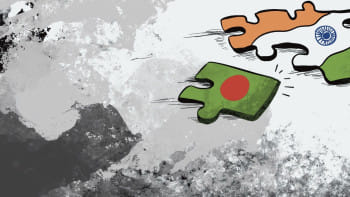Spreading false narratives will get Indian media nowhere

In journalism, there is a popular saying: if there is a dispute over whether it is raining or not, look out the window to see for yourself.
Since the ouster of former Prime Minister Sheikh Hasina in Bangladesh, a larger section of the Indian media has constantly been belittling the political changeover in Bangladesh as nothing but an emergence of extremist groups. In doing so, these "journalists" have been cherry-picking information about what has been happening in a tense, tumultuous time to tarnish the image of Bangladesh, with a pre-determined narrative. It is as if they look for information to fit the story they have already written about post-2024-uprising Bangladesh.
The main rhetoric in the Indian media is that minorities in Bangladesh have been subjected to communal violence after the student-led mass uprising toppled the Hasina regime. There is no denying the fact that homes and businesses belonging to Hindus were ransacked and set ablaze in the immediate aftermath, but so were many other establishments that belong to Muslims. Taking advantage of the political void and lawlessness that followed the ouster, people who had been victimised by the previous regime, as well as those who took the situation as an opportunity to loot properties and some fanatics unleashed a wave of attacks on their opponents or perceived enemies.
While I demand justice on behalf of the innocent men and women who suffered at that time, I will resist the manufacturing of the self-serving narratives that the Indian media is so fixated on—as vehemently as any Indian would do if the neighbouring country was judged by the 2002 Gujarat riots or the lynching of people from its minority Muslim community.
Hence, I request my Indian peers to come to Bangladesh, leaving behind prejudices, and see for themselves how things are before reporting on the country's evolving political and social situations. I appeal to them to stop portraying the country as a war zone. It is not. Things have been improving bit by bit since August 5, and we Bangladeshis are optimistic about reconciliation in a society that has been highly polarised for a decade or more to the benefit of a highly extractive political, economic and bureaucratic system.
This appeal comes from concerns that the misinformation and disinformation that journalists (who crossed over into the territory of YouTubers or activists) are spreading will ruin the potential of good relations between these two neighbours. One particular individual who has drawn my attention is Mayukh Ranjan Ghosh, senior editor of Republic Bangla. He is bent on proving that Bangladeshis are furious against the chief adviser of the interim government. It is a bizarre proposition unless he refers to the fallen political force and its sycophants.
Yes, Bangladeshis are frustrated because they are running out of patience to see a quick fix to the accumulated problems. A majority of them feel left out of the nation's economic growth over the last decade because it only exacerbated economic disparity. The macroeconomic indicators make it palpable. About a dozen banks have been dragged to near bankruptcy by close allies of Sheikh Hasina by borrowing huge amounts of money but never paying back. The capital market is in ruins because of corruption, manipulation and scams. The previous regime allowed politically influential people from the Awami League and bureaucrats, who served their interests, to exploit and distort the system of governance.
People are now suffering the consequences; they are not getting back deposits from the sick banks, the value of investments in scam-hit securities diminished, and commodity prices skyrocketed as inflation kept rising not only because of global tensions but also due to domestic mismanagement. In the meantime, jobs are scarce because the money borrowed from financial institutions on the pretext of business expansion was laundered abroad.
While the financial sector has been mercilessly beaten into the present sorry state for over a decade, it is now an uphill task to bring it back into order. The interim government has been given the mandate to bring reforms, but anyone can guess how challenging it must be. There are other concerns to address, such as rampant land grabbing, pollution of water bodies, and illegal construction of buildings, hotels, and other infrastructure by those who could get away with violating laws for their links to power before the August 5 changeover.
But Indian journalists like Mayukh Ranjan Ghosh tried to push the narrative that people were unhappy and divided in the post-August 5 era. He brought to notice some extreme sermons that criticised our national anthem, vilifying them for their lack of knowledge, but did not say how Bangladeshis around the world fought back against the force. What I hate to see is his depiction of attacks on minorities. Communal tensions have always had a presence in Bangladesh, kept alive by politicians as a calculated strategy targeting elections. Between 2012 and 2021, many attacks were made on minority communities: 2012 Ramu violence against Buddhist houses and monasteries; 2014 attacks on the Hindu community in Abhaynagar, Jashore; 2016 attacks on Hindus in Nasirnagar, Brahmanbaria over a fake Facebook post; and the 2020 attack on Hindu households in Muradnagar, Cumilla, for example.
The Awami League government did not ensure justice for the victims of those attacks, and we did not see Indian media personalities—such as Mr Ghosh—expressing concern and warning the then government against inaction. The Indian government, too, was not vocal at the time.
What has changed then? Mr Ghosh and his disciples will be able to tell. I would suggest one thing though: his yelling does not prove the points he wants to make. He has to contextualise his speeches and research a bit more to elevate his works to the standards of journalism.
Meanwhile, the damage rendered by the Indian media is that they have created a virtual version of Bangladesh as the political unpredictability offered them a good business opportunity with more and more audiences drawn to whatever content they made and promoted on social media platforms. That was feeding into an already tense psyche. The outrage in India expressed through attacks on Bangladeshi missions is inimical to the relations between the two nations.
What the present turmoil in Bangladesh demands is a supportive attitude from friends within and outside towards building an amicable environment for reforms that will help the country achieve equitable growth. We need reconciliation between opposing forces; we need harmony and solidarity to rebuild the nation for the better.
On Monday, during an official visit to Bangladesh, Indian Foreign Secretary Vikram Misri said India wanted to "carry on where we left off," meaning the disruption in the bilateral ties after Hasina's fall. "There is no second thought about increasing engagements. We see this as beneficial for both countries," he said. I hope the section of the Indian media that is bent on fuelling tensions between the two countries will take note. Above all, I expect them to uphold journalistic standards and present reports based on facts.
Bishakha Devnath is the business editor of The Financial Express.
Views expressed in this article are the author's own.
Follow The Daily Star Opinion on Facebook for the latest opinions, commentaries and analyses by experts and professionals. To contribute your article or letter to The Daily Star Opinion, see our guidelines for submission.

 For all latest news, follow The Daily Star's Google News channel.
For all latest news, follow The Daily Star's Google News channel. 








Comments